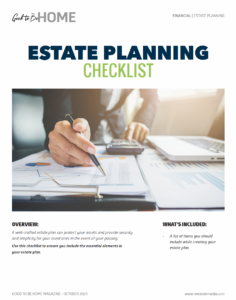The Power of an Estate Plan
An estate plan can provide a road map for securing your financial well-being, enabling you to make informed decisions, protect your assets, and support your loved ones after you’re gone. Eric Kaplan, managing partner of K&G Financial Group, explains the particulars of estate planning and shares what you need to know to get started.

Would you explain what an estate plan is?
In general terms, estate planning is the process of arranging your assets for transfer to family members, other individuals, or charitable organizations after you pass. The goal is to preserve your wealth and ensure that your assets are distributed according to your wishes in the event of your death or incapacitation.
What are the main components of an estate plan?
A strong estate plan should include a legally binding last will and testament along with designated beneficiaries and guardianship plans for minor children or an incapacitated adult, an estate, or both. Depending on your family’s needs, consider adding a trust, such as a revocable, irrevocable, or special needs trust, making sure to select a trustee to manage it once you’re gone or incapacitated.
Additionally, you should incorporate advance health care directives, including a living will, specific medical instructions, and a medical durable power of attorney, which assigns someone to carry out those instructions should you become incapacitated. It’s also a good idea to have a financial durable power of attorney selecting another person to handle your finances in such an event. Finally, create a letter of instruction regarding your burial wishes.
Who can benefit from an estate plan?
I believe everyone should have an estate plan regardless of their financial situation, age, or marital status. Sometimes the word estate is misunderstood to mean a large number of assets, such as a sprawling home, yacht, and vacation villa. However, it’s simply the sum of all your assets no matter their size or value, whether that includes a business or brokerage account or varying types of real estate. If set up correctly, it can save your family from additional taxes and court costs.

Can you craft your own estate plan?
While creating your own is possible, it’s not always the best solution since there are many potential mistakes you can make, leading to costly delays and complications for your heirs. Working with a qualified financial advisor and estate attorney will better help you build a plan tailored to your specific needs and goals and ensure your assets get distributed according to your wishes. However, if you are considering doing it yourself, be sure to do your research and understand the potential risks.
Is it expensive to put together an estate plan?
The costs will vary based on the complexity of your estate. Each estate planning professional has their own pricing structures, so consider consulting with a few to determine which one will work best for you based on your financial capabilities. For example, some may charge an hourly rate, while others may quote you a flat fee. Either way, be sure to know what will be included in their services and how long the process might take as this can affect the final cost.
Can you update your plan?
Yes. You should actually revisit your estate plan regularly; this can be done annually, semiannually, or quarterly, depending on your circumstances. It’s especially important to do after any significant life events, such as the birth of a child, the death of a spouse, a change in marital status, or a large purchase like a home or investment property. Each of these can impact your estate plan, requiring you to review it and make necessary changes.

What are the most common mistakes people make?
The main one is waiting too long to create an estate plan. Sometimes people underestimate their own mortality, which can be costly. Not having a will or a named guardian for minor children and failing to update your plan after a major life event, such as marriage, divorce, or the birth of a child, are also big mistakes that can put your assets at risk after your death.
What’s the best piece of advice you would give to someone without an estate plan?
I’ve seen situations where a family member died without signing their estate planning documents, meaning their wishes could not be fulfilled. So if you don’t have an estate plan, I encourage you to get started today. It’s never too early, and it’s one of the most important things you can do for yourself and your loved ones.




